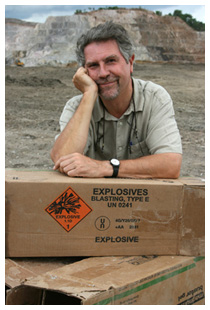
 |
THIERRY MICHEL
Thierry Michel was born on October 13, 1952, in Charleroi, Belgium, an area known as «The Black Country». At 16 he studied cinema at the Institut des Arts et Diffusion in Brussels where he recently came back to teach cinema. He experienced the last tremors before the students' upheavals which was to be the prelude to political enrolment in the militant and lyrical movements of the time. In 1973, he began to work as a filmmaker at the Belgian Television and realized numerous programmes all over the world. He dedicates his first films «Pays Noir, Pays Rouge» and «Chronique des saisons d'Acier» to the coal basin of his youth and his first fiction feature length «Hiver 60» tells of the insurrectional strikes of 1960. He alternated documentaries and fiction and managed to bring a camera inside a prison's walls to film «Private Hotel», a poignant hymn to liberty at the heart of confinement. After a long quest for his identity and his regional and political origins, Thierry Michel explored other continents and other dreams. The result was his second feature lenth film «Emergency exit», a poetical and mystical work set in the heart of the Moroccan desert which had always attracted him. He then came back to reality with two very moving pictures, «Kids from Rio» and «From the grass roots» which depicted the street urchins and the favelas of heart-rending Brazil. This was to be his first encounter with the black culture which he studied in-depth in Zaire with «Zaire, the cycle of the serpent», a many award winning film which ruthlessly portrays the ruling class and the rejects of Zaire society. He made a brief return to Belgium and filmed a Minister at the centre of a political and criminal scandal which has upset all of Belgium: «La grâce perdue d'Alain Van der Biest»; following this he packed his bags once more to investigate the validity of international armed charity with «Aid for Somalia : a losing battle». A few months later, he sets off for Zaire to shoot «The last colonials» a film on the colonial heritage and the presence of white people and white culture in the country after years of independence. A few days after his arrival, he is arrested, imprisoned and expelled from the country. His equipment is seized, and he finishes his film thanks to his own archives and images from the preliminary shooting. He directs «Post-colonial nostalgia», a film on the historical relationship between the Zairian people and white colons during the years of Congo/Zaire's independence. He then sets off for Africa once more, this time to shoot a major work, «Donka, x-ray of an African hospital». This tragic, human and uncompromising portrait of the Conakry hospital in Guinea will win prestigious awards both in Europe and in the United States. Thierry Michel pursues his work in the wake of his African experience: following the fall of the Zairian dictator, he starts shooting a historical documentary, somewhat reminiscent of great Shakespearean tragedies: «Mobutu, king of Zaire». After ten years and seven films made in Africa he goes back to Asia and the Republic of Iran, one of the cradles of Islamic fundamentalism. There he made his latest film «Iran, veiled appearances» in which he paints a portrait of a society that is socially and culturally split. The eye of the film-maker captures the religious fervour of some which contrasts so violently with the desire for freedom of others. Thierry Michel has an insatiable curiosity and has, for the last twenty years, not stopped filming all the beloved faced that inhabit the «sublime reality» of his camera. «The themes are the same, where you are. Man is the same, whether here or there; life and death are perceived identically. I have yet to stop working».
FILMOGRAPHIE
From coal mines to prisons, from Brazil and Maghreb to sub-Saharan Africa, Thierry Michel denounces the world's distress, sometimes blending fiction and reality. He was born on the 13 October 1952 in Charleroi, Belgium, in an industrial region known as «The Black Country». At 16, Thierry enrols at the Institut des Arts de Diffusion (Institute of Broadcasting Arts) in Brussels. Today he teaches cinema. In 1976 he is employed by Belgian television for which he makes many reports worldwide. He then moves on to cinema, alternating two fiction feature films with numerous documentaries which are internationally recognised, awarded and broadcast. Among these are « Kids from Rio », «Zaire, the snake's cycle», and «Donka, radioscopy of an African hospital», «Mobutu King of Zaire», «Iran Veiled Appearances». In projet /in developpement /in production :
Productions :
|